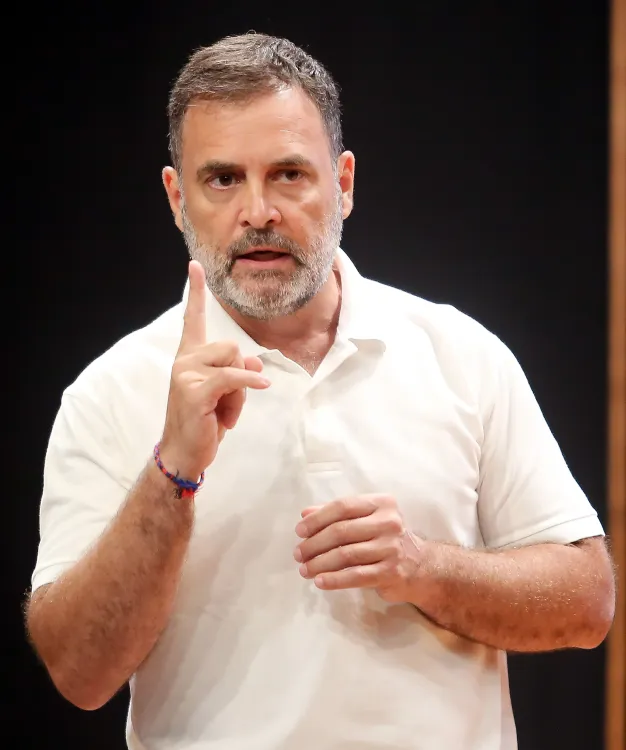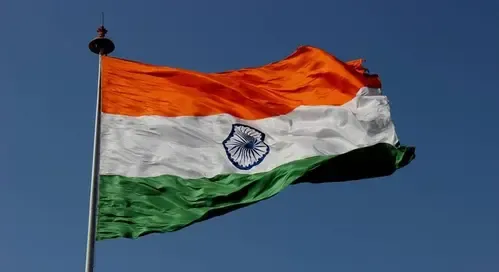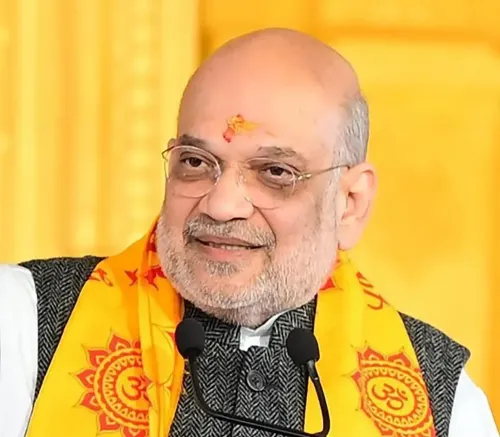Is Rahul Gandhi's 'Bomb' Talk a Political Agenda or Alarm?

Synopsis
Key Takeaways
- Political rhetoric can greatly influence public perception.
- Using extreme metaphors risks alienating voters.
- The youth, particularly Gen Z, are pivotal in shaping electoral outcomes.
- Public response often reflects accountability and governance.
- Constructive political dialogue is essential for democracy.
New Delhi, Sep 28 (NationPress) Political rhetoric serves as a significant instrument, yet when it veers from persuasion to sensationalism, it risks inciting fear and confusion among the populace.
Rahul Gandhi's frequent employment of "bomb" metaphors in his political discourse raises questions. Is this a calculated political strategy or merely alarmist theatrics?
Gandhi first invoked the "atom bomb" analogy to build suspense for his press briefing on August 7, where he accused the BJP of vote theft and criticized the Election Commission of India.
This approach aimed to attract nationwide attention; however, it did not yield the expected results. Subsequently, Gandhi proceeded with his Bihar march to generate momentum, yet the outcomes remained disappointing.
He then intensified his rhetoric, claiming he would "unleash a Hydrogen bomb" that would unveil "open-and-shut proof" of systematic electoral fraud.
Congress spokesperson and Rajya Sabha member Jairam Ramesh, who is closely allied with Gandhi, went a step further, asserting that Gandhi might unveil "mini-hydrogen, plutonium, uranium, and other bombs" as part of his campaign against the alleged vote theft. Ramesh made these remarks during the CWC meeting at the Congress headquarters, 'Sadaqat Bhavan', in Patna.
Coincidentally, while Ramesh was delivering these statements, Ladakh was grappling with unprecedented violence on September 24. Ramesh associated this unrest, which included the burning of a BJP office, with the issue of vote theft.
The use of "bomb" metaphors by both Gandhi and Ramesh carries perilous implications, invoking notions of destruction and fear. It begs the question: why should the Lok Sabha Leader of the Opposition adopt such language in political dialogue?
As the leader of the Opposition INDIA bloc, the Congress party possesses the right to conduct press conferences and scrutinize government actions. However, employing terms like "hydrogen bomb" or "atom bomb" risks perpetuating fear and uncertainty among citizens.
Moreover, Gandhi referenced Gen Z in his social media posts, framing the youth as champions of democracy and voters against alleged malpractices.
He posted on X, stating in Hindi (loosely translated): "The youth of the nation, the students of the nation, the Gen Z of the nation, will protect the Constitution, defend democracy, and prevent vote theft. I will always stand with them. Hail India!"
The timing of this allusion to Gen Z—following his second press conference on alleged vote theft—is noteworthy. Gandhi aimed to rally young individuals who, he believes, can incite a movement against Prime Minister Modi.
However, while Rahul Gandhi was attempting to appeal to Gen Z, his party colleague Manish Tewari remarked that Gen Z criticizes dynastic politics, entitlement, and nepotism.
"The toppling of - President Gotabaya Rajapaksa in Sri Lanka in July 2023, Sheikh Hasina in Bangladesh in July 2024, KP Sharma Oli in Nepal in September 2025 and now the protests against Ferdinand Marcos Jr in the Philippines have one word written over them - ENTITLEMENT IS NO LONGER ACCEPTABLE TO GEN X, Y, Z."
Perhaps Tewari, a member of the G-23, comprehends the underlying issues that led to the situation in these nations—public backlash against nepotism and corruption. The G-23 was established in August 2020 when 23 senior Congress leaders wrote to then-interim party chief Sonia Gandhi, demanding an "organisational overhaul" and reforms within the party, including a more active and visible leadership following electoral setbacks. Its members included notable leaders like Ghulam Nabi Azad, Kapil Sibal, Anand Sharma, and Shashi Tharoor.
Although the G-23 did not succeed in its objectives, the electorate in India does not falter in its verdict. The people express their decisions through their votes. They have kept Congress out of power at the Centre since 2014 and restricted its influence in states like Uttar Pradesh and Bihar. Yet, the same electorate checked the BJP in the 2024 Lok Sabha elections, indicating that arrogance in power is intolerable.
History demonstrates that Indians respond to governance and accountability, not inflated rhetoric. The public penalized Rahul Gandhi's grandmother, Indira Gandhi, for the Emergency from 1975 to 1977.
Utilizing sensational language, such as "bombs", reveals Gandhi's own mindset rather than swaying the electorate. In January, he declared that Congress was not only fighting the BJP and its ideological mentor, RSS, but also the "Indian state".
In this context, Gandhi's "bomb" metaphors may reflect his strategic desperation more than electoral realities.
While Rahul Gandhi resorts to such tactics to confront PM Modi, others have sought to provoke religious discord and violent incidents.
Maulana Tauqeer Raza Khan, a politician and Islamic cleric whose party supports Congress, employed religious rhetoric to incite passions, leading to violence in Bareilly, Uttar Pradesh. Similar unrest was reported in Uttar Pradesh's Mau, Unnao, Kaushambi, Gujarat's Gandhinagar, and Karnataka's Davangere.
These religion-based protests possess the potential to incite large-scale chaos, metaphorically comparable to atomic or hydrogen bombs. Surely, Rahul Gandhi is cognizant of the perilous ramifications of such rhetoric.
His consistent references to "bombs" in political dialogue prompt critical inquiries: is this rhetoric a strategic maneuver to galvanize voters, or does it risk engendering undue alarm among citizens? Regardless, the deployment of such extreme metaphors underscores the delicate balance between political discourse and public intimidation.
(Deepika Bhan can be contacted at deepika.b@ians.in)










